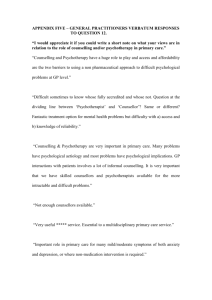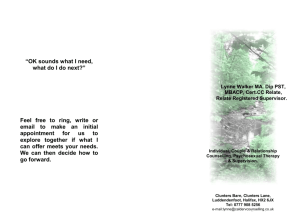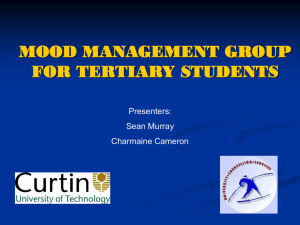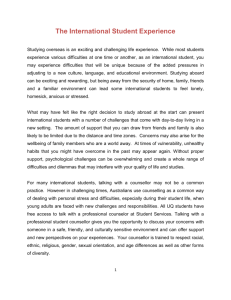Document 10466828
advertisement
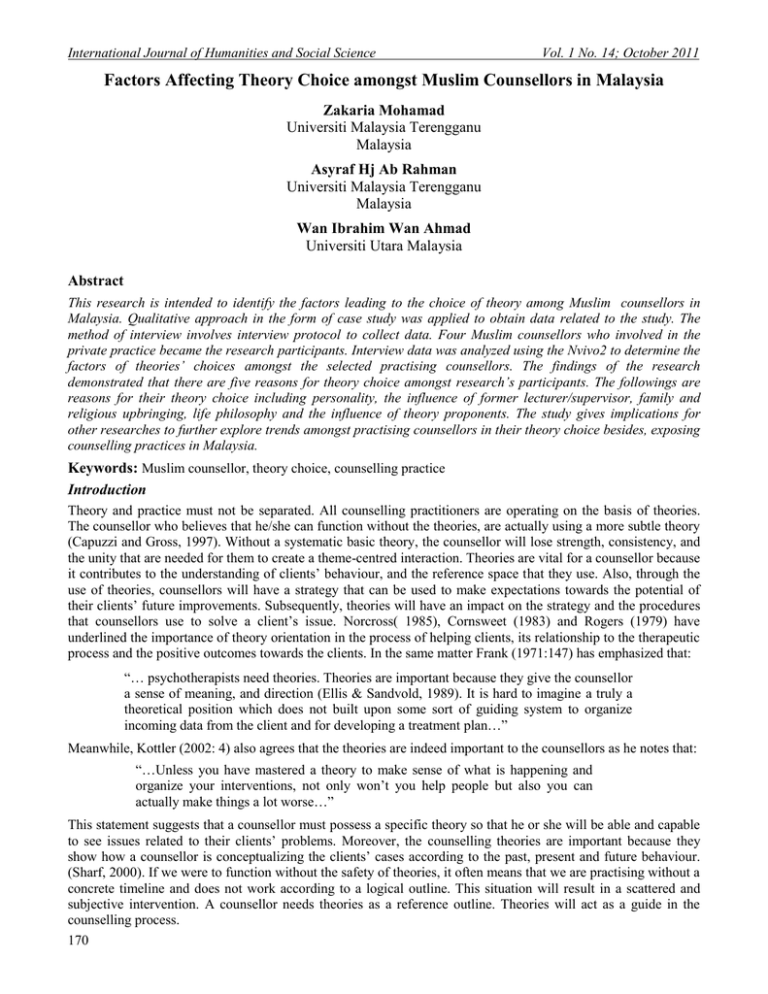
International Journal of Humanities and Social Science Vol. 1 No. 14; October 2011 Factors Affecting Theory Choice amongst Muslim Counsellors in Malaysia Zakaria Mohamad Universiti Malaysia Terengganu Malaysia Asyraf Hj Ab Rahman Universiti Malaysia Terengganu Malaysia Wan Ibrahim Wan Ahmad Universiti Utara Malaysia Abstract This research is intended to identify the factors leading to the choice of theory among Muslim counsellors in Malaysia. Qualitative approach in the form of case study was applied to obtain data related to the study. The method of interview involves interview protocol to collect data. Four Muslim counsellors who involved in the private practice became the research participants. Interview data was analyzed using the Nvivo2 to determine the factors of theories’ choices amongst the selected practising counsellors. The findings of the research demonstrated that there are five reasons for theory choice amongst research’s participants. The followings are reasons for their theory choice including personality, the influence of former lecturer/supervisor, family and religious upbringing, life philosophy and the influence of theory proponents. The study gives implications for other researches to further explore trends amongst practising counsellors in their theory choice besides, exposing counselling practices in Malaysia. Keywords: Muslim counsellor, theory choice, counselling practice Introduction Theory and practice must not be separated. All counselling practitioners are operating on the basis of theories. The counsellor who believes that he/she can function without the theories, are actually using a more subtle theory (Capuzzi and Gross, 1997). Without a systematic basic theory, the counsellor will lose strength, consistency, and the unity that are needed for them to create a theme-centred interaction. Theories are vital for a counsellor because it contributes to the understanding of clients‟ behaviour, and the reference space that they use. Also, through the use of theories, counsellors will have a strategy that can be used to make expectations towards the potential of their clients‟ future improvements. Subsequently, theories will have an impact on the strategy and the procedures that counsellors use to solve a client‟s issue. Norcross( 1985), Cornsweet (1983) and Rogers (1979) have underlined the importance of theory orientation in the process of helping clients, its relationship to the therapeutic process and the positive outcomes towards the clients. In the same matter Frank (1971:147) has emphasized that: “… psychotherapists need theories. Theories are important because they give the counsellor a sense of meaning, and direction (Ellis & Sandvold, 1989). It is hard to imagine a truly a theoretical position which does not built upon some sort of guiding system to organize incoming data from the client and for developing a treatment plan…” Meanwhile, Kottler (2002: 4) also agrees that the theories are indeed important to the counsellors as he notes that: “…Unless you have mastered a theory to make sense of what is happening and organize your interventions, not only won‟t you help people but also you can actually make things a lot worse…” This statement suggests that a counsellor must possess a specific theory so that he or she will be able and capable to see issues related to their clients‟ problems. Moreover, the counselling theories are important because they show how a counsellor is conceptualizing the clients‟ cases according to the past, present and future behaviour. (Sharf, 2000). If we were to function without the safety of theories, it often means that we are practising without a concrete timeline and does not work according to a logical outline. This situation will result in a scattered and subjective intervention. A counsellor needs theories as a reference outline. Theories will act as a guide in the counselling process. 170 © Centre for Promoting Ideas, USA www.ijhssnet.com By practising theories, the complexities in therapeutic situation can be reduced. Also, it offers alternatives to understand and seek the solutions for emotional reaction in the relationship between the counsellor and the client (Lovinger, 1992). Apart from that, theories can offer explanations to the possibilities of reasons as to why clients act, feel and think in the ways they do. Interventions can be made according to the client‟s expectations. Thus, counsellors have to ensure that their choices of theories are effective in their attempt to lessen the human woes they are dealing with.Counselling theory provides an outline that enables counsellors to understand the changes that happen in clients‟ thoughts, feelings and behaviour. Hence, the mastery of theory will enable counsellors to plan a strategy to understand clients systematically in order to solve the problems. In this matter, Rogers (1957 in Corey 2001:176) states that among the conditions that are needed for the changes in clients‟ personality is through “...the therapist experiences an empathic understanding of the internal frame of reference and strives to communicate this experience to the client...”. There is no specific theory that could satisfy the clients‟ every need. Thus, many counsellors agree that it is preferable to apply more than one theory in the counselling process. Approximately, there are more than 400 counselling theories that have been created ever since the Freud development theory (Corsini & Wedding, 1995). However, the problem often lies in the question of how to integrate the variety of theories and prepare them for the clients. (Ginter, 1988). After almost two decades, the experts have still not yet discovered the most effective approach. (Lambert,1992,Stiles et al,1986). Although it is generally known that each theory approach contributes to a meaningful finding, the question is how to put the theories to the optimum benefit for the counsellors. Researchers, such as Whiston and Sexton (1993), also Goldfried et. Al. (1990) are making things more complex by finding out that theory or counselling approach have almost nothing to do with the personal quality of a counsellor (Hattie et. al. 1984). At the same time, the new research findings (Lyddon, 1989) show that clients tend to do better if they are referred to counsellors who share the same perspectives in life or having various theories relevant to the needs of the clients. Despite the importance of theory in counselling session and its effectiveness in assisting the clients‟ need, there was a lack of emphasis on the theory aspect in the counselling curriculum in Malaysia Public Universities. According to the report by the Malaysia Board of Counsellors (2000), the counselling practice in Malaysia does not put a great attention on the theory aspect which at the end, may cause to the lack of theory understanding among counsellors themselves. In the public universities that offer counselling courses for undergraduate and postgraduate studies for instance, there are only 3 credits hours for theory counselling subject in the curriculum. This scenario is different as compared to the counselling practice in the universities in United States whereby the counselling theory subject is given 4 hours credit and is carried out thoroughly. Moreover, the theory specification is also offered to students (CACREP 2001) considering the importance of theory to counsellors (Brammer & Shostrom 1993; Murdock 1991; Othman 2000; Baruth and Huber 1985; Sharf 2000; Lovinger 1992 and also Education Research Report and Malaysian Public Universities Counsellor Practise (Malaysia Board of Counsellors, 2000). Moreover, the practising counsellors, especially Muslim counsellors are much influenced by their family, culture and religious upbringing in the choosing appropriate theories which suit to their needs. As a result, they became hesitate with certain theories that from their view point may be in contradiction to their religious principles. This paper therefore will discuss factors leading to theory choice amongst Muslim counsellors and their experience using certain theory that suit to their needs during the counseling sessions. Research Methodology This qualitative research uses the multi-case multi-site design research outline. The methods of data collection are in-depth interview, using interviews protocol to investigate the appropriate themes in analyzing the phenomenon under research participants. The research location is Kuala Lumpur area. The research participants are chosen using the purposive sampling, involving five Muslim counsellors registered with the Malaysian Board of Counsellors. In this study they are named as P1, P2, P5 and P6. They possess the ability to reflect and are able to offer explicit explanations related to the topics under research as suggested by Rubin and Rubin (1995) and Stake (1994). The data analysis method includes the process of verbatim data, data reduction, theme building and the presentation of results. The Nvivo 2 software is used for theme building. 4. Result and Discussions Results of the research are analyzed using the Nvivo 2 software, and have produced the main themes for the factors of theory choice and functions. Research participants as mentioned earlier are those Muslim counsellors who are private practitioners in Kuala Lumpur area. 171 International Journal of Humanities and Social Science Vol. 1 No. 14; October 2011 4.1: Personality Result of the study shows that personality becomes one of the important factors affecting theory choice amongst the research participants. This can be seen from an interview with P5 who explains that she chooses the Client Centred Theory because her personality in many ways is much related to the similar theory as she notes,“...throughout my study, I have been practising it right. I have my own personality, and I have a compassionate nature towards humanity, and I can empathize with my fellow humans, and that is where my desire to help comes...” (P5:50)An in-depth interview with the participant also indicates that she has a loving personality and thus, assisting and helping others become her utmost priority which is in conformity with Rogers‟s unconditional positive regard concept. In addition, she describes that helping other fellow human become part of her religious duty as the Prophet mentioned; „the best among you are those who have the best manners and character (Sahih al-Bukhari, Vol. 8: 56b) 4.2: Lecturers/Supervisors For P3, he chooses the theory on the basis of the influence from his lecturer/supervisor whom he regarded as his role model in the theory choice. His statement gives further explanation: “...I think I have to talk about my former lecturer. Mrs H from Universiti Putra Malaysia has influenced me a lot....”(P2:156) His further explanation suggests that the participant‟s way of thinking and reaction in regards to counselling are much influenced by his former mentor or lecturers when their names are mentioned frequently as examples. This tendency clearly indicate the importance of lecturers role in participant‟s life. Lecturers or teachers are indisputably their pupils‟ none such exemplars. Pupils acquire the good traits and sound trends, as well as the virtuous behavior and equanimity, from their teachers whose guidance and conducts penetrate to their hearts. The Prophet said, “Seek knowledge and train to be dignified and calm while seeking knowledge, and humble yourselves with those whom you learn from” (Tabaraani). Arrogance with the one you learn from is an evil trait and one who has such a characteristic will never succeed; slighting the teacher, mocking him and humiliating him are characteristics of hypocrites, as the Prophet said, “Three types of people would not be mocked except by a hypocrite, an old Muslim man, a knowledgeable person and a just leader” (Tabaraani). At this point, it seems that the participant has the above mentioned characteristics. 4.3: Family and Religious Upbringing A similar question was asked to P5. The impact of family upbringing, especially from her father is very memorable to P5. To her, father has set a fine example by bringing up his children in a fair and just way. This upbringing has influenced her decision to choose a theory which bears resemblance to his father‟s leisure faire, non directive and attentive approach in raising a family. As she notes; “...I have a lot of respect towards my father.. his fairness and his love for us especially. He treats us all justly.. . I am close to him. I follow him wherever he goes to teach. I learn a lot from his personality...”(P5:61) Looking to family and religious upbringing within Muslim community in Malaysia, there was a clear evident that parents have a great impact on their children upbringing. Respect and loving for parents are often perceived as a religious duty amongst Muslims. In this respect, the participant‟s theory choice is based on her existing belief enunciated by his parents particularly her father in regard the way he treat his children such as non directive, fair and attentive approaches and always listen to others. This belief is much related to one of the prophet traditions when it is recorded on authority of Ibn Majah that a man asked the Holy Prophet ( )(صلى هللا عليه وسلم, “What rights the parents had on their children.” The Holy Prophet answered, “Both are your Paradise and your Hell.” It seems that the participant apply the selected theory based on the way she was brought up especially in a way her father treated her. This approach in many way suit with humanistic-existential theory that put emphasis on human as a subject with potential capacity and capability that can be developed if properly encouraged and trained. 4.4: Life Philosophy For P1 and P6, both have respectively chosen a theory according to their own personal life philosophy. The chosen theory is regarded as worthy and in conformity to their personal way of life or their life principles. This is emphasized through the following statements: 172 © Centre for Promoting Ideas, USA www.ijhssnet.com „While attending course in regards to the theory or psychotherapy practice, I feel that the subject matter is related to what proposed by Carl Rogers, as it suits to my life principles and my firm religious background...”(P6:72) This statement indicates that the research participant still have a compromise in terms of theory choice where he accept the Western Carl Roger‟s theory which in his viewpoint has no contradiction to his religious belief and suit his life philosophy. In this respect, religion is seen as playing an important role for many Muslim counsellors in Malaysia as suggested by P6. Religious factor also will determine and influence the way the counsellor treat his client and to some extents it will be regarded as a compliment to other existing theory employed so long as the latter not contradict to the religious principles. An in depth interview with the participant demonstrated that he was a firm religious believer and considered what he was doing and practising as part of his religious duty. In this respect the Prophet mention on the Muslim responsibility towards other fellow Muslims: “You will not enter Paradise until you have faith and you will not have faith until you love one another. Do you want me to tell you something you can do to make you love one another? Make it a habit to greet one another with “Assalaamu Alaykum” – peace upon you”. (Narrated by Muslim) For P1, he strongly agrees that his life philosophy influence him a lot in theory choice as a Muslim counsellor. He notes: “... I agree..that‟s true..now that I think about it, I can see that the reason why I choose this theory is because the philosophy behind it is very much relatable to my own life philosophy...”(P1:249) This statement indicates that to some extent, individual life philosophy especially amongst the Muslim counsellor give an impact for the way he react to other‟s personal needs or strive to be expert at exploring clients' frames of reference. 4.5: Theory Proponents There are also participants who choose a theory in respect to its proponents, for example,P1. His statement as to why he chooses the Existentialist theory is as follows: “...Yes, I am influenced by the thinking of Victor Frankle. He influenced me a lot. I also accept the idea that everyone will die one day, see? That is why one has to do something meaningful in life. So, these sorts of thinking do influence my way of thinking...”(P1:253) Despite family and religious upbringing, this counsellor used to follow theory and apply such them based on his respect to its proponent and their philosophy. There are several factors leading to this phenomenon among which are one‟s contribution towards other fellow men be it the idea, thought or advice. More importantly, every individual has a role to play towards others. Thus, any theory proponents whose idea and philosophy considered to be something impressed and meaningful will be acknowledged and become valuable for their followers. As religious believer, he was on a firm belief that there will be a reward in the hereafter for those doing the right thing in life particular helping and assisting other fellow human beings. 5. Conclusion The theory choice is vital for every counsellor as it will guide them to produce therapeutic counselling sessions. The study highlights the factors leading to the theory choice amongst practising counsellors in Malaysia including family upbringing, personality, influence of supervisors, personal life principles and the influence of the theory proponents upon them. The religious and cultural background also seems to have an influence on the theory choice amongst those Muslim counsellors. This is due to their Islamic religious upbringing particularly in Malaysia, whereby clients‟ trust upon their counsellor will increase when religious elements are emphasised during counselling session. More importantly the above said factors are still in agreement to what has been discussed and found by other researches in the similar field of study as done by Hansen et al. (1986), Johnson et al. (1992), Larson (1980), Sundland (1977) and Freeman (2003). References Baruth, L.G. & C.H. Huber 1985. Counseling and psychotherapy: theoretical analysis and skills applications. Columbus: Charles E. Merill Publishing Company. Brammer, L.M., Shostrom, E.L. & Abrego, P.L. 1993. Therapeutic psychology: fundamentals of counseling and psychotherapy (5th.ed.) Englewood Cliffs: NJ: Prentice Hall. 173 International Journal of Humanities and Social Science Vol. 1 No. 14; October 2011 Capuzzi, D. & Gross, D.R. 1995. Counseling and psychotherapy. Englewood Cliffs, NJ Prentice-Hall Corey, G. 2001. Theory and practice of counseling and psychotherapy (6th ed) Thomson Learning, CA: Brooks/ Cole Cornsweet, C. 1983. Nonspecific factors and theoretical choice. Psychotherapy: Theory, Research and Practice (20): 307-313 Corsini, R. & Wedding, D. 1995. Current psychotherapies. (5th ed) Itasca, IL: Peacock CACREP. 2001. Council for Accreditation of counseling and related educational program, committee on standards revisions. 1999. CACREP : The 2001 standards. Arlington, VA : CACREP. Ellis, G.J.& sandvold,K.D.1989.A case of penile obsession and compulsive hyper sexuality: conceptual frameworks and responsible eclecticism in individual and family psychotherapy. Journal of Mental Health cunseling 11: 193-212 Frank, J.D. 1971. Psychotherapists need theory. International Journal of Psychiatry 9:146-149 Ginter, E. J. 1998. Stagnation in eclecticism: The need to recommit to a journey. Journal of Mental Health Counseling 10(1): 3-8. Goldfried, M.R., Greenberg, L.S.,& Marmar, C. 1990. Individual Psychotherapy : Process and outcome. Annual Review of Psychology 41: 659-688 Hattie, J.A., Sharpley, C.E., Rogers. H.J. 1984. Comparative effectiveness of professional and paraprofessional helpers. Psychological Bulletin 95(3): 534-541. Hadith of the Prophet (Prophet‟s Traditions) Kottler, J. A. 2002. Theories in counseling and therapy; an experiential approach. Boston : Allyn & Bacon Lambert, M.J. 1992. Psychotherapy outcome research: Implication for integra-tire and eclectic therapists. In J, C. Norcross & M.R. Goldfield (Eds.), Handbook of psychotherapy integration (pp. 94-129). New York: Basic Books. Malaysia Board of Counselors, 2000. The Report of Education and Counselor Practice Malaysian Universities. The Bureau of Counseling Practical and Education First Counselor Board.Kuala Lumpur Lovinger, R.J.,1992. Theoretical affiliations in psychotherapy. Psychotherapy 29(4): 586-590 Lyddon, W.J. 1989. Personal epistemology and preference for counseling. Journal of Counseling Psychology 36(4): 423-429. Murdock N.L. 1991. Case Conceptualization: Appling Theory to individuals. Counselor education and supervision 30: 355-365. Norcross, J.C. 1985. In defense of theoretical orientations for clinicians. The Clinical Psychologist 38: 13-17. Othman Mohamed, 2000. The psychotherapy and counselling management principles. Universiti Putra Malaysia. Serdang. Rogers, C. R. 1979. Client-centered therapy: Its current practice, implications and theory. London: Constable Rubin, H. J. & Rubin, I. S. 1995. Qualitative interviewing: the art of hearing data. London : Sage Publications. Sharf, R. S. 2000. Theories of psychotherapy and counseling. Concepts and Cases.(2nd ed.) Pacific Grove, CA: Brooks/Cole Stake, R. E. 1994. Case studies dlm Denzin, N.K.& Lincoln, Y.S.(penyt.). Handbook of Qualitative research. Hlm. 236-247. Thousand Oaks: sage Publications. Stiles, W.B., Shapiro, D.A., Elliot R. 1986. “Are all psychotherapies equivalent?” American psychologist 41(2): 165-180. Whiston, S. C. & Sexton. T. L. 1993. An overview of psychotherapy outcome research: implication for practice. Professional Psychology: Research and Ppractice.24(1):43-51. 174
